Key takeaways:
- Understanding myths shapes our perceptions, allowing for personal growth and challenging preconceived notions.
- Common myths, such as “money can’t buy happiness” and “success is linear,” influence our decisions and mindsets significantly.
- Analyzing myths critically through techniques like researching historical context and engaging in discussions enriches our understanding and empathy.
- Exploring the origins and meanings behind myths can illuminate personal values and societal narratives, leading to transformative insights.
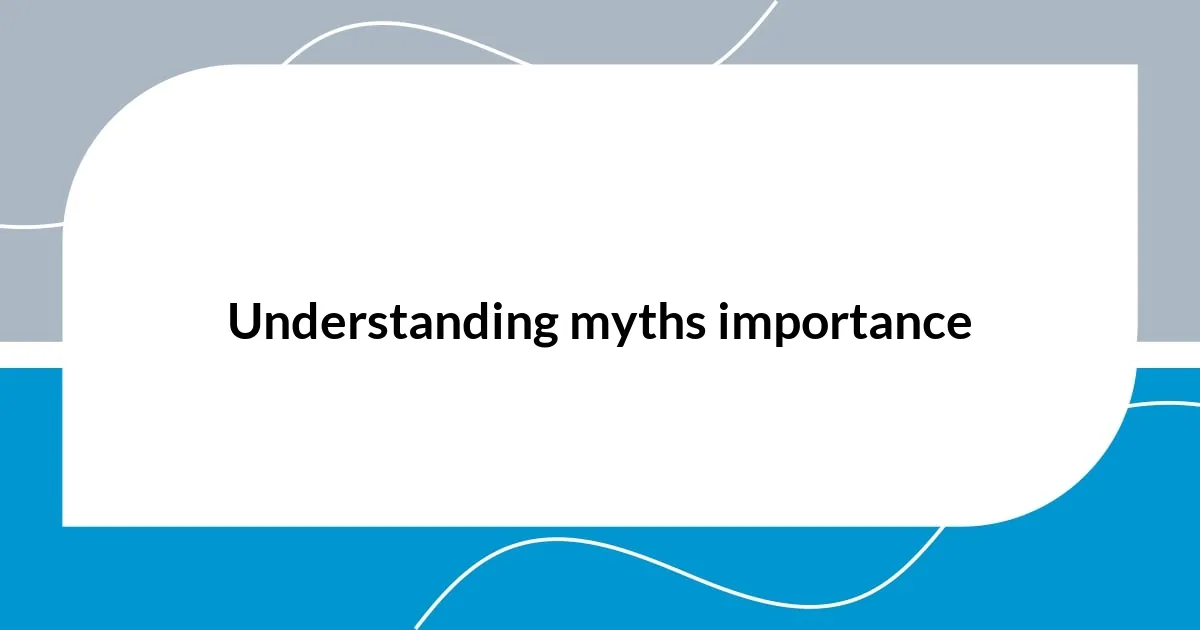
Understanding myths importance
Understanding myths plays a crucial role in shaping our perceptions and beliefs about the world around us. I remember a time when I believed a common myth about a historical figure, only to discover later that the reality was vastly different. That experience made me realize how myths can color our understanding and lead to misconceptions.
Additionally, examining myths allows us to explore cultural narratives and human experiences that resonate deeply with us. When I engage with stories from different cultures, I often feel a sense of connection and empathy, as if these tales reflect universal truths about the human condition. Doesn’t it make you wonder how many of our own beliefs are rooted in the narratives we’ve accepted without questioning?
Delving into the importance of understanding myths also provides an opportunity to challenge preconceived notions. It pushes us to question why certain stories persist and what motivations lie behind them. I often find myself reflecting on the myths that shaped my upbringing and how they influenced my choices, sparking an endless curiosity about the truth. Wouldn’t you agree that this exploration can lead to personal growth?
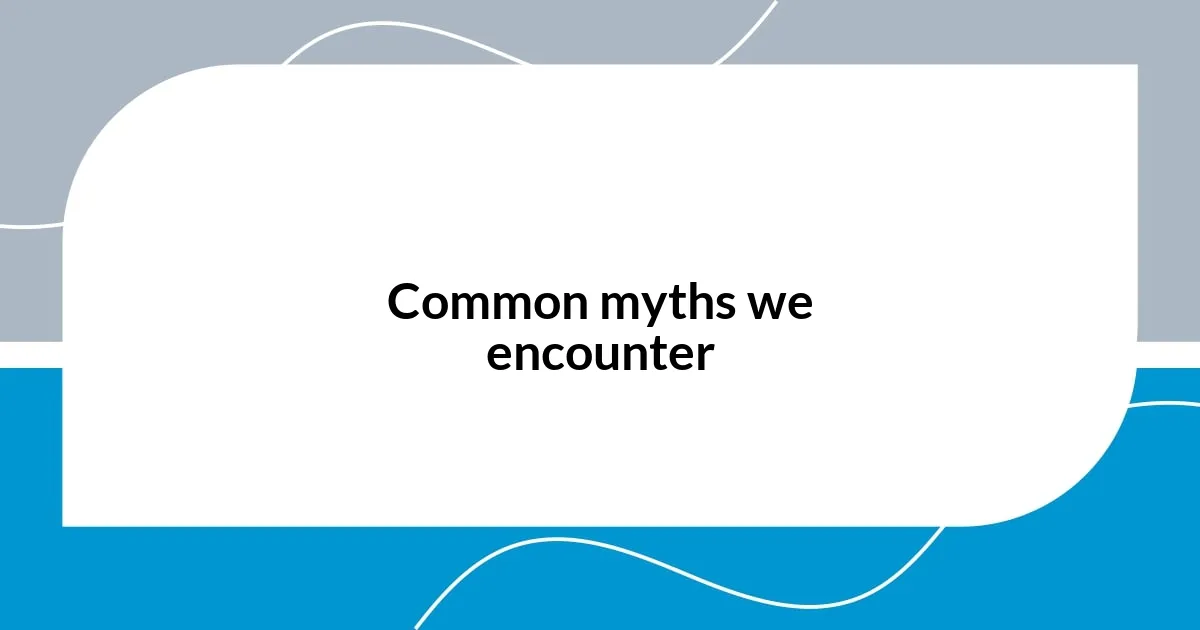
Common myths we encounter
Common myths permeate our daily lives, often shaping how we view ourselves and the world. One that frequently comes to mind is the belief that “money can’t buy happiness.” I used to embrace this idea wholeheartedly. However, after experiencing financial struggles, I realized that while money isn’t a guarantee for happiness, it does provide a sense of security and opportunity that can lead to a more fulfilling life. Isn’t it fascinating how a simple myth can so profoundly impact our decisions and mindsets?
Another prevalent myth is the notion that “everyone should follow their passion.” In my journey, I’ve learned that passion is often just one piece of the puzzle. I once believed that pursuing passion alone would lead to success, but the reality is that hard work, perseverance, and practicality are crucial too. Accepting this has allowed me to find a balance, leading to unexpected joy in areas I never thought I’d love. Isn’t embracing this complexity so liberating?
Finally, the myth of “success is linear” is something that I think we all encounter. In my experience, success has felt more like a winding road filled with ups and downs rather than a straight path. I recall the time I faced setbacks that ultimately steered me toward opportunities I had never anticipated. It’s such a refreshing perspective to understand that our journeys can be unpredictable yet rewarding.
| Myth | Reality |
|---|---|
| Money can’t buy happiness | It provides security and opportunities. |
| Follow your passion | Success needs a mix of passion, hard work, and practicality. |
| Success is linear | Success is often a winding journey with ups and downs. |
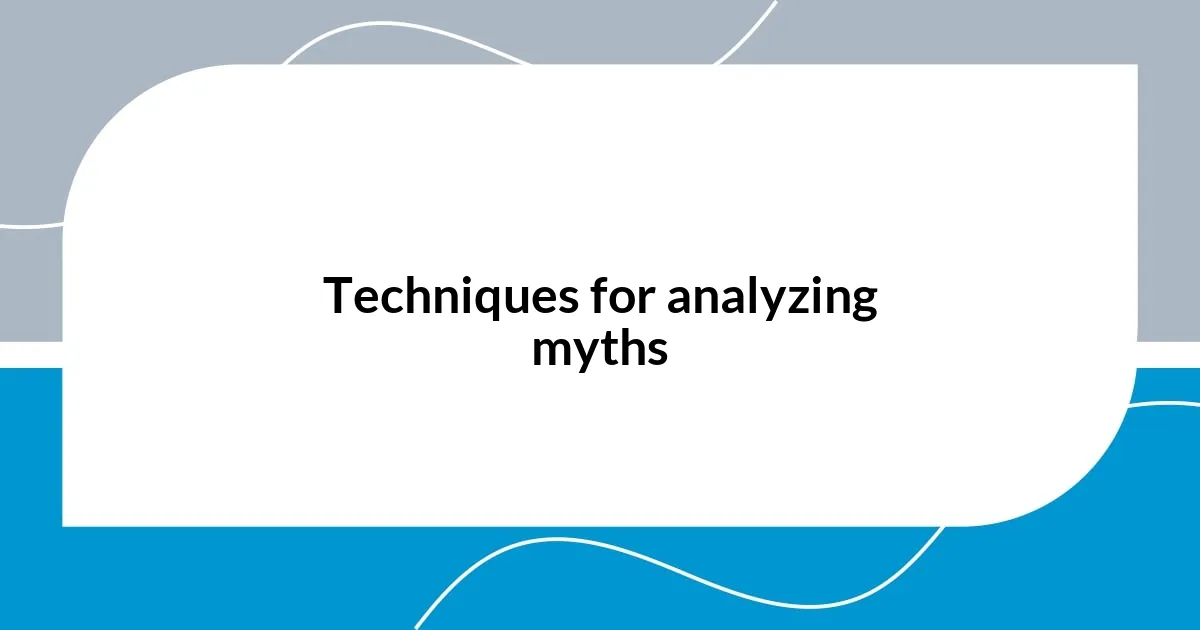
Techniques for analyzing myths
When it comes to analyzing myths, I find that employing critical thinking is essential. This means not just accepting what I hear but actively questioning its validity. I once stumbled upon an old myth about a famous inventors’ alleged eureka moment. Digging deeper, I discovered that the truth was much more nuanced, reminding me that the reality of many stories is far richer than the myths we often hear.
Here are some techniques I use for analyzing myths:
- Research historical context: Understanding the time and culture can unveil the reasons a myth arose.
- Examine sources: I always consider who created or propagated the myth. Their background can color the story significantly.
- Identify common themes: Spotting patterns among different myths provides insight into human psychology and societal values.
- Engage in discussions: Talking with others, whether in person or online, opens up new perspectives and interpretations of a myth.
- Reflect on personal experiences: I often relate the myth to my life. It helps me evaluate how my beliefs may have been shaped.
Using these techniques not only enhances my understanding, but also enables me to connect more deeply with the narratives that shape our world. Analyzing myths becomes a personal journey of exploration that can be both enlightening and empowering.
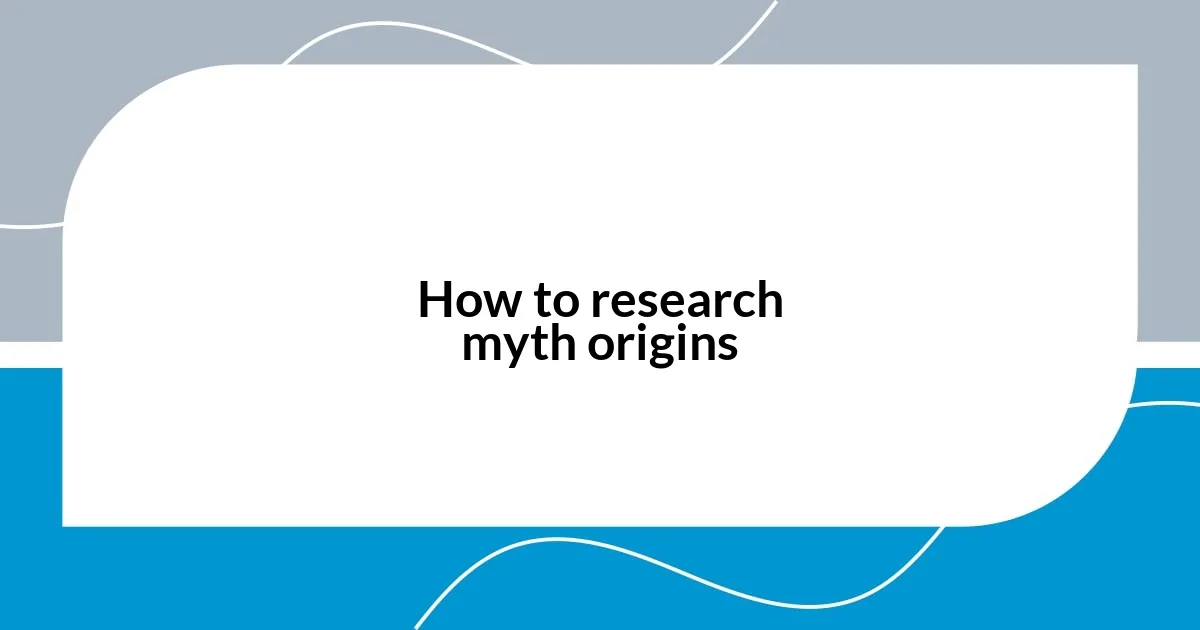
How to research myth origins
To research the origins of myths, I always begin by diving into the cultural and historical context that surrounds them. For instance, I once looked into the myth of the phoenix, a creature reborn from its ashes. I discovered that its roots trace back to ancient civilizations, signifying renewal and transformation—concepts that resonate deeply with me. Isn’t it incredible how understanding the backdrop can change our perception of a myth entirely?
Examining various sources is crucial as well. I vividly remember unpacking a popular myth about a legendary hero’s feats, only to find that many of the details varied wildly among different cultures. This sparked a realization for me: the myths we cling to often serve diverse purposes within their respective societies. It raises the question—why do certain stories endure while others fade away? The answers can be as enlightening as the myths themselves.
I also find it rewarding to engage in discussions with others about myth origins. A couple of years ago, I joined a local book club that explored mythological tales. By sharing interpretations and listening to differing viewpoints, I gained fresh perspectives that challenged my assumptions. Have you ever had a conversation that reshaped your understanding of something you thought you knew well? It’s these interactions that often illuminate aspects of myths I hadn’t considered before, enriching my knowledge and appreciation for these narratives.
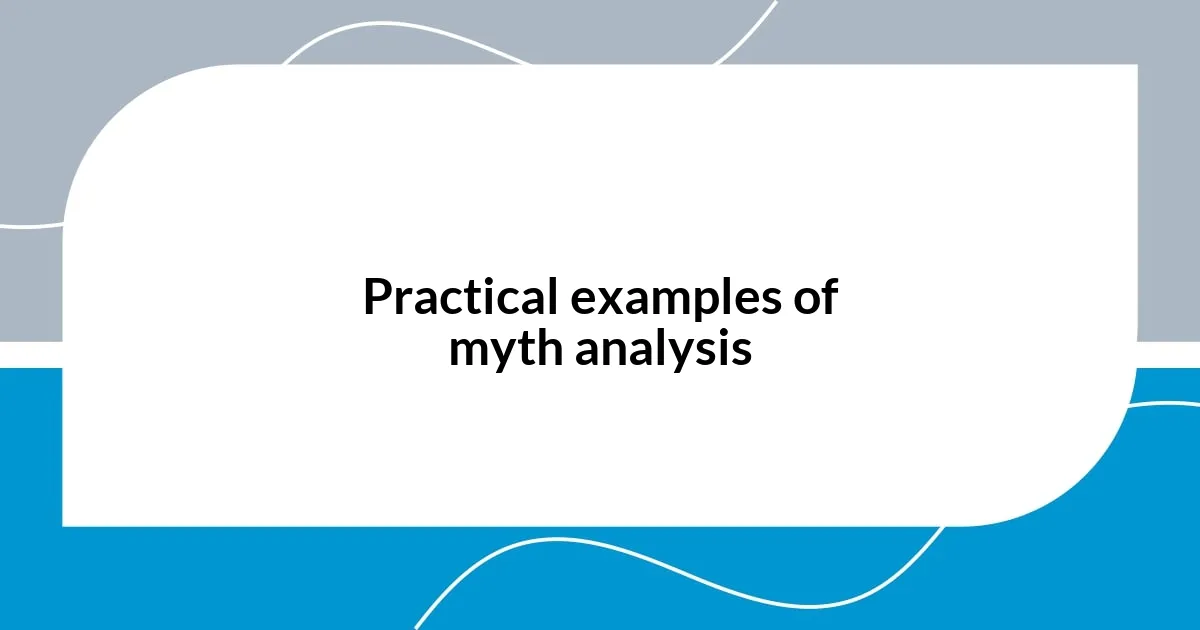
Practical examples of myth analysis
One practical example of myth analysis I’ve found valuable is when I explored the myth of the “all-knowing guru.” I initially believed that such figures had all the answers, but I learned through discussions with peers that many are just individuals sharing their life experiences. This realization shifted my perspective—what truly matters is the wisdom we gather through our unique journeys rather than blindly following someone else’s narrative. Have you ever considered how your beliefs might have been influenced by that one person you admired?
Another approach I took involved dissecting family myths passed down through generations. For instance, my grandmother often spoke about how our ancestors crossed treacherous waters to seek a better life. I began to question how much of her story was legend versus fact. In researching the historical events surrounding that era, I discovered that while the trials were real, some elements of the story had been embellished. It was like peeling back the layers of an onion, revealing both the struggles and the resilience that shaped my family’s identity. Isn’t it fascinating how personal myths can illuminate our values?
Lastly, I remember noticing recurring themes in myths from different cultures about the “hero’s journey.” I connected with this idea deeply, reflecting on my own challenges and growth. When I examined stories from different backgrounds, I was struck by how various cultures celebrate resilience, courage, and transformation. This prompted me to ask myself: how have my experiences mirrored those mythic journeys? Exploring these connections has made me appreciate the universality of stories, helping me find meaning in my own life’s narrative.
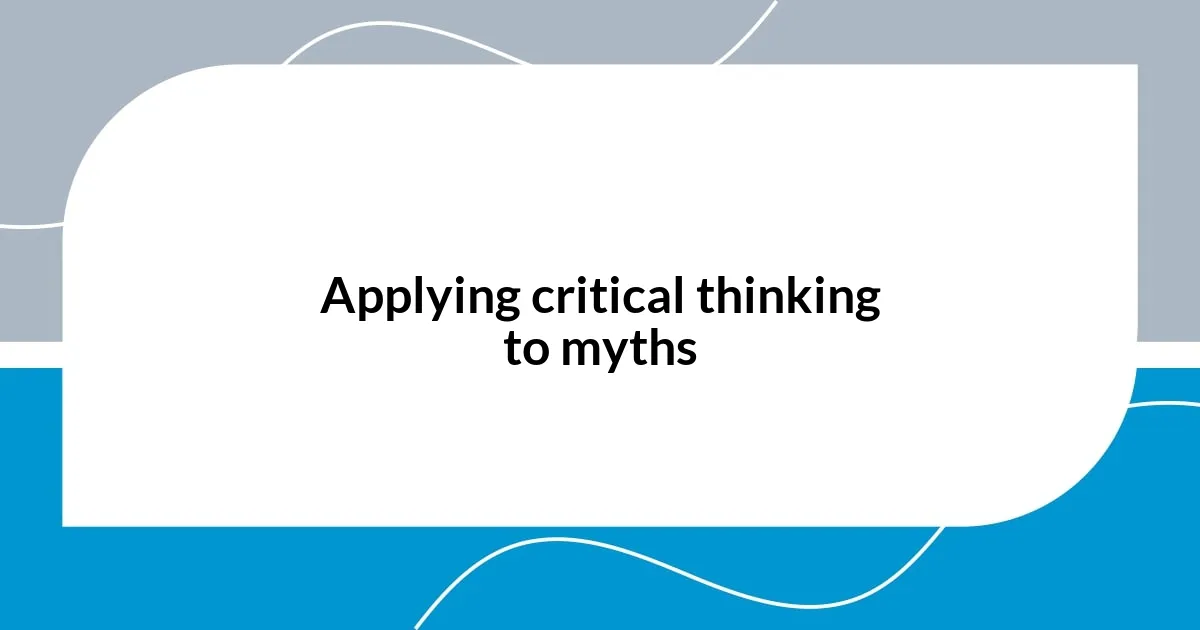
Applying critical thinking to myths
Applying critical thinking to myths allows us to navigate the intriguing landscape of stories with a discerning mindset. I recall a time when I stumbled upon the myth of Medusa, often depicted as a monster. Initially, I accepted this characterization without question. However, as I delved deeper, I discovered that her story is layered with themes of vulnerability and victimization. Learning this prompted me to reconsider how narratives around individuals can mask their true complexities. Have you ever felt that a popular narrative just didn’t align with your understanding?
I find that dissecting the emotional undercurrents within myths is equally enlightening. For example, while examining the tale of Orpheus and Eurydice, I realized it embodies profound themes of love and loss. This exploration resonated with me personally—many of us have experienced heart-wrenching farewells. The emotions presented in this myth helped me reflect on my own experiences, sparking the question: how do our personal stories mirror mythic journeys of connection and grief? It’s moments like these that make me appreciate how myths often serve as a mirror to our human experiences.
Engaging critically with myths also means questioning the societal narratives they perpetuate. I remember examining the myth of the “damsel in distress” and its implications on gender roles. As I explored various retellings, I discovered how these archetypes can limit our understanding of strength and agency. This realization led me to ponder how often I might subconsciously accept stereotypes in my own life. It’s these layers of inquiry that awaken a deeper understanding of myths, pushing me to embrace a more inclusive perspective. How have myths shaped your perceptions of yourself or others?
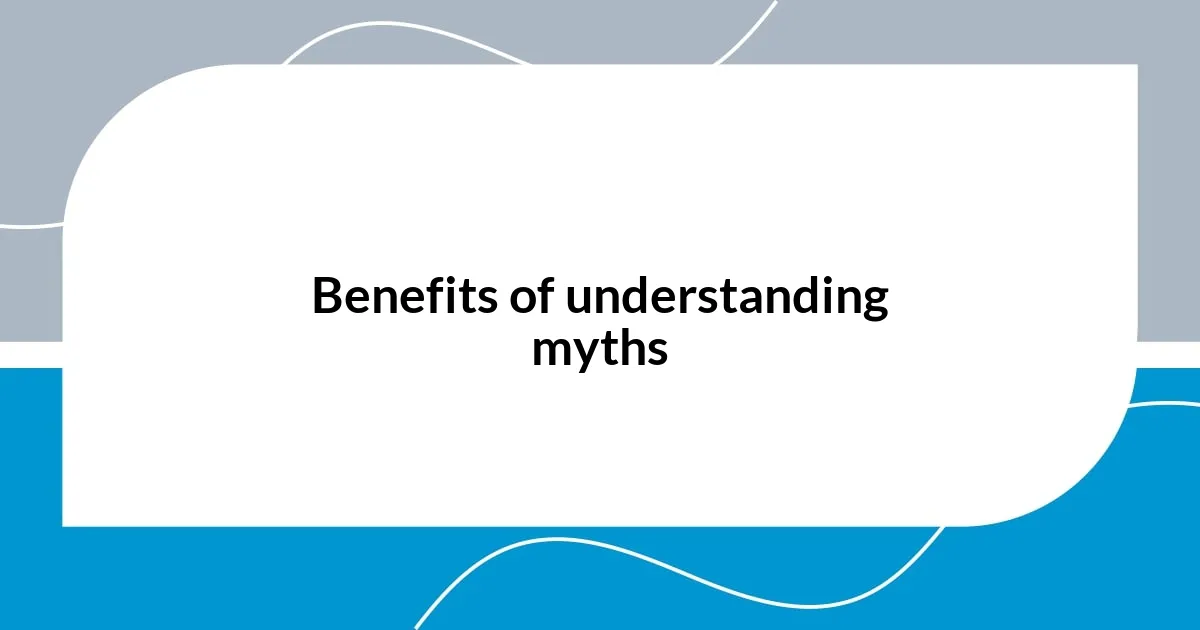
Benefits of understanding myths
Understanding myths offers profound benefits that enrich our lives. One significant advantage is the clarity it brings to our personal identities. I remember grappling with the myth of “achieving success at all costs.” Initially, this idea fueled my ambitions but often left me feeling drained. Once I unpacked this myth, I recognized the importance of self-care and balance, which ultimately guided me to a more fulfilling path. Have you ever felt pressured by a belief that didn’t truly resonate with your values?
Additionally, understanding myths fosters empathy by helping us see the world through different lenses. When I explored myths from various cultures, I encountered stories of community, sacrifice, and resilience that mirrored my struggles. For example, immersing myself in African folklore made me reflect on my family’s values around togetherness and support during tough times. This exploration not only deepened my appreciation for diverse backgrounds but also highlighted our shared human experience. Don’t you find it enriching to discover how connected we truly are through these ancient tales?
On a broader scale, analyzing myths equips us with critical thinking skills that challenge societal narratives. I once considered the myth that “money brings happiness.” Reflecting on this belief revealed how often I equated financial success with personal worth. Through discussions with friends and literature on the subject, I realized that joy often stems from relationships, experiences, and personal growth. This insight transformed my approach to life, prompting me to ask: what beliefs have I unconsciously accepted, and how can I reshape them for greater fulfillment? Understanding myths isn’t just about knowledge—it’s a transformative journey.